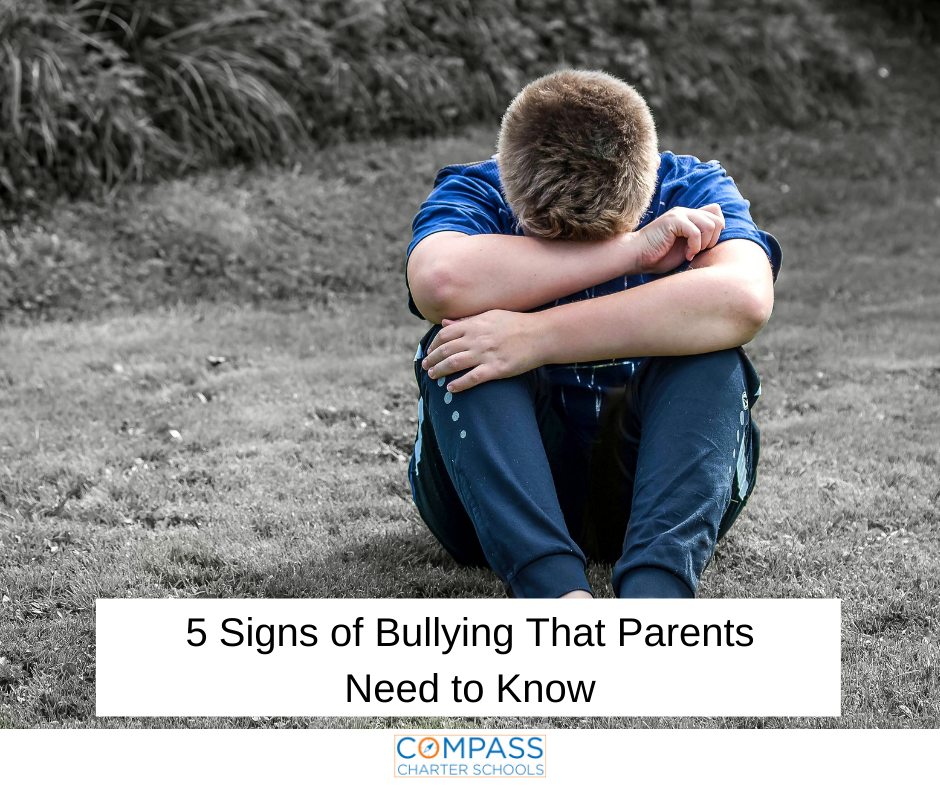
October is National Bullying Prevention Month and Compass Charter Schools (CCS) is recognizing the important awareness campaign by sharing a few important signs of bullying that parents should be aware of to help keep their children safe.
In general, bullying is defined as unwanted, aggressive behavior among school-aged children that involves a real or perceived power imbalance. Unfortunately, children can experience bullying in several different ways, which can have significant negative impacts. In the 2017 School Crime Supplement, the National Center for Education Statistics and Bureau of Justice reported that, nationwide, about 20 percent of scholars ages 12-18 experienced bullying. In the same year, the Centers for Disease Control and Prevention survey results indicated that, nationwide, 19 percent of scholars in grades 9–12 report being bullied on school property in the 12 months preceding the survey.
CCS has an experienced team of credentialed school counselors who have shared five common signs of bullying that parents should be aware of to help protect their children from the negative impacts of bullying and help put an end to bullying altogether.
Signs a Child Is Being Bullied
In general, we encourage parents to look for unexplained changes in their child’s behavior, mood, disposition, opinions, and temperament. However, we do caution that not all children who are experiencing bullying exhibit these warning signs.
Unexplainable injuries & physical discomfort
If a child unusually starts coming home from school or another social setting with injuries or physical discomfort like headaches and stomach aches that they can’t explain, this could indicate that they are being bullied. Often, if a child is being physically bullied, they will use the same excuse (i.e. I tripped and fell) repetitively to explain their injuries and discomforts. Or, in some cases, they won’t have an excuse and may say that they don’t remember how they got hurt. In other cases, the child may start faking illness or sickness to avoid having to go to school or out in public with their peers. In this situation, we encourage parents to closely monitor their child’s injuries and the frequency of injuries. Then, we strongly encourage parents to consult with a school counselor or other professional counselor to receive proper guidance to address the concern of bullying. Consulting a professional is the most effective and safe way to stop the bullying.
Lost or destroyed personal belongings
In some cases, a bully will destroy someone else’s belongings. If a parent notices that their child frequently comes home from school or other social settings with ripped clothes, torn books, broken toys or destroyed schoolwork, this could mean that they are being bullied. Destroyed personal property could mean that the child is being bullied by their peers. We encourage parents to calmly talk with their child and find out how the item was broken. It’s important for parents to take this time to listen to their child, and avoid making false accusations, while their child explains how their belongings broke. If the child continues to come home with broken belongings, then we strongly encourage parents to consult a professional counselor to seek guidance and put an end to the possible bullying that their child is experiencing.
Change in eating habits
The effects of bullying vary. A common result of bullying is a loss of appetite. If a child suddenly loses interest in eating they could be experiencing bullying. Or, some children may start binge eating to cope with stress and anxiety they may feel as a result of being bullied. We encourage parents to closely monitor their child’s eating habits if they start to notice a change. Their child may start coming home from school hungry because they did not eat lunch or a snack. Or, they may lose their appetite if they’re being bullied online or on social media. Parents can also ask their child’s teacher to monitor their eating habits at school. As always, we strongly encourage parents to consult a professional counselor if they notice a significant and unhealthy change in their child’s eating habits to receive the proper guidance and support for their child.
Difficulty sleeping or frequent nightmares
If a child is being bullied in a social setting or online they may start to have difficulty sleeping or they may start having nightmares. Being bullied can take a very serious, emotional toll on a child, which can result in anxiety that makes falling asleep difficult. Sometimes, if a child is being bullied, they may replay the hurtful words or incident over in their minds while trying to fall asleep and that can make sleeping challenging. Nightmares can occur if the child has a dream about their experience being bullied. If the painful experience weighs heavy on their subconscious they could start to have bad dreams about being bullied. Parents may start to notice that their child resists bedtime or takes much longer to fall asleep. Their child may even start to wake up in the middle of the night afraid or anxious because they had a nightmare. We encourage parents to talk with their children about their change in sleep routine to try and gently discover if bullying may be the cause. Parents can monitor their child’s sleep routines and speak with a professional counselor if they feel that their child may be losing sleep because they are being bullied.
Declining grades, loss of interest in schoolwork, or not wanting to go to school
Our final sign of bullying is focused on a change in academic performance. If scholars are being bullied at school their grades could drop or they could start resisting going to school. Children can also experience bullying in virtual academic environments. It’s important for teachers and parents to monitor a child’s academic experience to reduce their chances of being bullied. If a child is being bullied at school they may start to lose focus during class, which can hurt their test scores and overall grades. If the bullying is very intense, the child may even resist attending school altogether to avoid the bully and the uncomfortable experience. Thankfully, CCS is an Energy Bus School that’s committed to providing a safe, open, and positive learning environment for scholars, and CCS has a great team of credentialed school counselors who can support scholars if they are being bullied. We always encourage parents to communicate with their child’s teachers and school staff to monitor academic performance and overall educational experience. If parents start to notice a significant change in their child’s grades, test scores and overall desire to be present at school, they can contact a professional counselor for guidance and support.
_________________________________________________________________________________________________________________________________________________________
Compass Charter Schools (CCS) is a WASC-accredited virtual charter school that serves families throughout California. Interested in learning more about CCS’ flexible academic programs? Visit our website, or contact our enrollment team at enrollment@compasscharters.org or (877) 506-8631.
